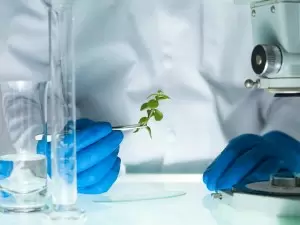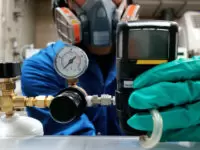
Biochemistry is the study of living things at the molecular level, focusing mainly on the processes that occur. For example, they may study cell development, how cell structure relates to function, how cells communicate with each other to fight disease or regulate an organism's development, and how they metabolize food and oxygen.
Many biochemists study how pharmaceutical drugs and foods affect an organism's biology. Some also study how environmental toxins are metabolized, and how they may disrupt biological processes.
Because biochemistry encompasses all living things, it's a very wide field of study with a range of applications in medicine, agriculture, and the environment.
Learn more about biochemistry degrees.
What Does a Biochemist Do?
Biochemists may study cellular and molecular processes to increase our general understanding about them, or work on solving specific problems. For example, they may try to figure out how a chemical like Bisphenol A (BPA), found in some plastics, affects the human body. Others may try to discover how certain genes or environmental factors cause disease, and how to suppress or "turn off" the errant mechanism. Those working in agriculture research ways to genetically modify crops for resilience to drought or pests. Some work on developing biofuels.
Regardless of the field of application, most biochemists perform many of the same duties. They plan and conduct experiments to isolate, quantify and analyze hormones, enzymes, and toxins, and to determine the effects of substances like drugs, food and toxins on biological processes. They may also develop new analytical techniques to detect pollutants and their metabolites, or to study biological processes. They may also use computer software to determine the three-dimensional structure of molecules, or use math to describe the chemical relationships between substances found in the environment and in the body. They also share research findings by writing reports, recommendations, or scientific articles, or by presenting at scientific conferences.
This field clearly plays an important role in public health. Biochemists helps determine the environmental causes of disease - information that can help policymakers eliminate or reduce risk, and potentially help doctors treat the conditions. But biochemistry is vital to many aspects of sustainability as well.
For example, these scientists may study the toxicological effects of industrial chemicals and other pollutants on wildlife. Some discover new ways to use the biological processes of plants and microbes to break down these pollutants. Some are working on solving the food crisis by developing inexpensive, high-yield, nutritious, and sustainable crops. Others study ways to turn the energy in waste products, crops, and algae into biofuels. Some biochemists are trying to develop artificial photosynthesis, a process intended to mimic the way plants derive energy from the sun, to develop solar fuel.
Where Does a Biochemist Work?
Biochemists work for a variety of industries and government agencies. For example, they may analyze the effects of air, water, and soil pollution on people, wildlife, plants, and crops for the U.S. Environmental Protection Agency or Department of Agriculture. They may also study the effects of drugs or food for the National Institutes of Health or the Food and Drug Administration. Many biochemists are employed by pharmaceutical firms and companies dealing with food-related chemicals such as animal feed, agricultural chemicals, and food for human consumption, where they conduct research to understand disease and develop new products. Some work in manufacturing, energy development, or environmental restoration firms. Others work in hospital laboratories. They may also work as faculty, research staff, or teachers at colleges, universities, and secondary schools. Some also work for law firms, where they deal with scientific cases.
Most biochemists work indoors in laboratories and offices. Some, especially those working for environmental restoration firms, may travel to outdoor work sites. Lab and field work may result in exposure to biological or chemical hazards. Following established safety procedures is important in these situations.
Most biochemists work full time, and many work more than 40 hours per week. Employers, industries, and work environments can vary by the type of biochemistry practiced.
Branches of Biochemistry
- Clinical Biochemistry - The practice of laboratory medicine in hospitals and clinics. Practitioners test lab samples for patients to diagnose disease, determine risk, and optimize treatment. Clinical biochemists may also conduct medical research and improve laboratory equipment and practices.
- Analytical Biochemistry - Uses sophisticated equipment to analyze biological samples. For example, analytical biochemists separate and test samples to determine the substances they contain, and the quantities of those substances. For example, they might test a blood sample to determine the presence and quantity of steroids or toxins.
- Medical Biochemistry - Deals with biochemistry in its medical context. Practitioners study how disease is generated, how cells react to disease, what mutations lead to cancer, how drugs interact with cells, and how nerve signals are affected by chemicals.
- Nutritional Biochemistry - Studies how the body derives energy and nutrients from food, and how different diets promote health or contribute to disease.
- Comparative Biochemistry - Compares how different species or classes of organisms perform similar functions, such as how they react to stress or regulate glucose levels. Such comparisons can help us better understand our own biochemistry and health.
- Plant Biochemistry - Largely deals with photosynthesis - how plants metabolize carbon dioxide and sunlight to create sugars and release oxygen. It also studies how they process pollutants from the air, soil and water. Some plants can filter out contaminants in the environment and break them down into harmless components. Plant biochemists study how these processes work, which can help restore contaminated sites.
What Is the Average Biochemist Salary?
The U.S. Bureau of Labor Statistics (BLS) reports a median salary of $94,270. The top 10% in the field earn about $169,860.*
What Is the Job Demand for Biochemists?
Employment in this field is expected to grow 5% between 2020 and 2030. The number of jobs in the field is projected to increase by 1,600 during this time.* Due to an aging population, much of the growth will be in medical research. However, increased pressure on food and energy resources will drive growth in agricultural and biofuels research. Concerns about pollution will also expand opportunities for biochemists who work on toxicological effects and bioremediation.
Much of the research in biochemistry and biophysics, particularly at colleges and universities, is dependent on funding from the federal government. Federal budgets and the availability of research funding may affect the job market from year to year.
Biochemistry Jobs & Job Description
As with many other types of science, biochemist research jobs are divided into two areas that span the fields of medicine, agriculture, fuels, nanotechnology, environmental concerns and management: work in basic research is conducted to expand human knowledge, whereas applied research is directed toward using findings to solve a stated problem. Biochemists may also choose to focus on teaching or business applications. Regardless of specialty, biochemistry jobs require the following types of skills:
- Efficiently use advanced technologies, such as electron microscopes, lasers, and computer modeling, chemical enzymes to isolate, analyze, and synthesize proteins, enzymes, DNA, and other molecules and research the effects of drugs, hormones, and food on these structures and their processes
- Prepare technical reports, research papers, and recommendations based on their research
- Present research findings to fellow scientists, engineers, and other colleagues and stakeholders
- Develop and conduct quality control procedures for materials, chemical compounds and final products
- Assist in grant proposal writing and applications
- Develop new chemical formulations and processes
- Devise new technical applications of industrial chemicals and compounds
Senior tier biochemist jobs may have the following elements in addition to tier-one responsibilities:
- Supervise other chemists, chemical technicians and technologists.
- Manage laboratory teams and monitor the quality of their work
- Manage laboratory workspace and materials procurement
- Participate in interdisciplinary research and development projects working with chemical engineers, biologists, microbiologists, agronomists, geologists or other professionals
- Act as consultant in their field of expertise
- Participate in the commercialization of new products
How Do I Get a Biochemistry Degree?
Most biochemists earn a B.S. in biochemistry, chemistry, or biology. Coursework generally includes classes in biology, chemistry, physics, and computer science, as well as required lab work. Biochemistry programs typically cover cell biology and signaling, genetics, the structure and function of molecules, enzymology, proteins and membranes, disease mechanisms, and metabolism. You'll also study math, which is used in biochemistry to work with statistical data and calculate concentrations.Some universities offer a one-year post-graduate training program in laboratory techniques, which is highly valued by many private companies. Some let you work towards a bachelor's degree and a microbiology-related certificate at the same time.
While those with bachelor's degrees may qualify for some entry-level positions, most biochemists earn advanced degrees. Graduate study usually involves a lot of laboratory work, and allows you to specialize in a particular area like molecular biology or bioinformatics. Graduate students earn degrees (M.S. or M.A.) in Biochemistry, Biochemistry and Molecular Biology, Biochemical Engineering, Biological Sciences, Biomedical Sciences, or other related areas.
However, doctoral degrees are required for positions involving independent research and development. Ph.D. programs generally include more advanced coursework on biochemistry, as well as independent research. Most newly minted PhDs start out in postdoctoral research positions. These positions can lead to publication, which is crucial to landing a permanent research position. Many biochemists bide their time in multiple postdoctoral positions before getting a permanent academic appointment.
Degrees Related to Biochemistry
What Kind of Societies and Professional Organizations Do Biochemists Have?
- The American Society for Biochemistry and Molecular Biology (ASBMB) advances the field by publishing multiple journals and organizing scientific meetings. It also offers grant writing and mentoring workshops for postdocs, offers career resources, and holds career symposia on college campuses.
- The American Chemical Society (ACS) represents professionals at all degree levels and in all fields of chemistry, as well as other sciences that involve chemistry. It holds annual and regional meetings, and posts presentations from past national meetings online. It organizes technical divisions, local sections and student chapters. It also offers workshops, short courses, and symposia related to the chemical sciences, and provides a portal to resources on green chemistry called the Green Chemistry Institute.
*2020 US Bureau of Labor Statistics salary figures and job growth projections for biochemists and biophysicists reflect national data not school-specific information. Conditions in your area may vary. Data accessed September 2021.





